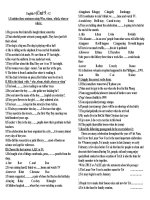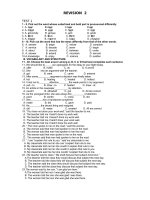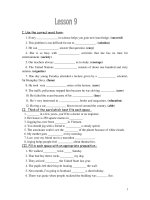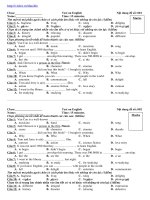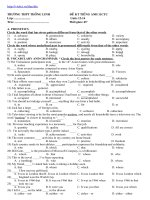REVISION (U1-2)
Bạn đang xem bản rút gọn của tài liệu. Xem và tải ngay bản đầy đủ của tài liệu tại đây (117.02 KB, 4 trang )
Trang 1/4 - Mã đề thi 357
CONSOLIDATION (UNITS 1–2)
Mark the letter A, B, C, or D on your answer sheet to indicate the word or phrase that is
OPPOSITE in meaning to the underlined part in each of the following questions.
Question 1: You will appreciate your health more once you are seriously ill.
A. take more care of yourself B. realize how important your health is
C. ignore completely your health D. pay more attention to your health
Question 2: John is a rich man, but he is very mean.
A. caring B. helpful C. generous D. sincere
Read the following passage taken from Streamline English – Oxford University Press and
mark the letter A, B, C, or D on your answer sheet to indicate the correct word(s) for each
of the blanks from 3 to 7.
My most embarrassing experience (3)______ when I had just left university. I had just started
teaching in a Liverpool secondary school. One morning my alarm clock didn't ring I (4)______
to wind it up. I woke up at half past eight and school began at nine. I quickly washed, shaved,
dressed, jumped into my car and (5)______ to school. When I arrived the students had already
gone into class. I didn't go to the staff room, but went straight into class. After two or three
minutes the students began laughing, and I couldn't understand (6)______! Suddenly I look
down and understood. I had (7)______ one black shoe and one brown shoe!
Question 3: A. suspected B. took C. happened D. started
Question 4: A. didn’t forget B. forgot C. was forgetting D. had forgotten
Question 5: A. went B. drove C. rode D. arrived
Question 6: A. how B. when C. why D. what
Question 7: A. taken back B. put on C. used up D. wore out
Mark the letter A, B, C, or D on your answer sheet to show the underlined part that needs
correction.
Question 8: Members of the jury, which identities will be kept secret, will be paid $40 a day.
A B C D
Question 9: The contents of the boy's pockets and his bag was thoroughly examined by his
A B C
mother though he strongly protested.
D
Question 10: I’m tired of your repeating absence from my class, Tom. If you are absent
A B
once again, please didn’t enter my class.
C D
Question 11: Sam had stayed out late before, so we didn’t get particularly worrying when he
A B C D
didn’t return.
Question 12: The broken thief noticed that a house unlocked. After looking round carefully, he
A B
decided to break into it.
C D
Mark the letter A, B, C, or D on your answer sheet to indicate the word whose underlined
part is pronounced differently from that of the rest in each of the following questions.
Question 13: A. famous B. embarrass C. imaginative D. attraction
Question 14: A. notice B. opener C. showed D. humorous
Trang 2/4 - Mã đề thi 357
Mark the letter A, B, C, or D on your answer sheet to indicate the sentence that is closest
in meaning to each of the following questions.
Question 15: “Why are you always talking in class, Tom?” said the teacher.
A. Tom’s teacher complained about his continually talking in class.
B. Tom’s teacher was disappointed that he always talked in class.
C. Tom’s teacher felt angry with his noisy talks in class.
D. Tom’s teacher disapproved of his little talking in class.
Question 16: The last letter she received from him was before he became a soldier.
A. It has been ages since he last wrote to her.
B. From the point he joined the army, he started to write to her.
C. She hasn’t heard of him since he joined the army.
D. He didn’t have any intention of writing to her when he decided to become a soldier.
Question 17: “If you don’t buy that doll, I won’t go home.” said the little girl to her mother.
A. The little girl insisted that her mother buy her that doll.
B. The little girl threatened her mother not to go home if she didn’t buy that doll.
C. The little girl’s mother said she would buy her that doll if she went home.
D. The little girl told her mother to buy that doll.
Question 18: It often takes me two hours to go to school.
A. I don’t often go to school less than two hours.
B. I often spend two hours going to school.
C. I often need two hours to going to school.
D. I often use two hours to prepare before going to school.
Question 19: Jake has given me a lot of advice and support whenever I have difficulty.
A. I have never been given a lot of help to overcome difficulties by Jake.
B. Jake’s and my difficult problems have helped us grow up.
C. Jake has always suggested good ideas when I am in difficult situation.
D. Jake has helped me out of a number of difficulties.
Mark the letter A, B, C, or D on your answer sheet to indicate the word or phrase that is
closest in meaning to the underlined part in each of the following questions.
Question 20: One lap around the park is precisely two miles.
A. closely B. imitatively C. nearly D. exactly
Question 21: Everyone has many acquaintances.
A. relatives B. tutors C. friends D. neighbors
Question 22: She was in a very embarrassed situation. She felt so stupid and was lost for
words.
A. wanted to escape from the crowds B. lost consciousness
C. didn’t remember what had been done D. didn’t know what to say
Read the following passage adapted from wikimedia.org and mark the letter A, B, C, or D
on your answer sheet to indicate the correct answer to each of the questions from 23 to
27.
In Germany, a German typically only has very few friendships, which however normally last
for a lifetime as loyalty is held in high regard. Friends in Germany are expected to help each
other in every possible sense. Germans may appear aloof to people from other countries, as
they tend to be cautious and keep their distance when it comes to meeting new people, which
explains ongoing intercultural differences with people from English-speaking countries.
Additionally, friends use the informal personal pronoun “du”, which is otherwise only used for
family members, as well as their respective first names. The development from becoming an
acquaintance to a friend can take several months.
In Russia, one typically accords very few people the status of “friend”. These friendships,
however, make up in intensity what they lack in number. Friends are entitled to call each other
Trang 3/4 - Mã đề thi 357
by their first names alone, and to use nicknames. A norm of polite behavior is addressing
“acquaintances” by full first name plus patronymic. These could include relationships which
elsewhere would be qualified as real friendships, such as workplace relationships of long
standing, or neighbors with whom one shares an occasional meal or a customary drink.
Question 23: Germans’ real friendships ______.
A. are regarded as normal relationships B. have many changes
C. may never end up D. must be respected in any way
Question 24: Which of the following can be inferred from the passage?
A. Germans don’t want to have any contact with people from English-speaking countries.
B. Germans are not friendly.
C. The German culture shares few similarities with that of English-speaking countries.
D. A German can have many names.
Question 25: In Russia, it is considered impolite ______.
A. to address people you know little about by full first name
B. to use short names
C. if you suggest having a meal with your neighbors
D. if an acquaintance calls someone by his first names
Question 26: The word “standing” is closet in meaning to ______.
A. changing B. continuing C. not sitting D. existing
Question 27: Which of the following is NOT true according to the passage?
A. When someone becomes friend of a German, he is considered a family member of that
German.
B. Germans only accept other Germans as friends.
C. Both Germans and Russians have very few friendships.
D. Neighbors or colleagues can always be real friends to Russian.
Mark the letter A, B, C, or D on your answer sheet to indicate the word that differs from
the rest in the position of the main stress in each of the following questions.
Question 28: A. sympathy B. unfriendly C. acquaint D. apartment
Question 29: A. personality B. confidence C. understanding D. residential
Question 30: A. extremely B. concern C. rumor D. experience
Mark the letter A, B, C, or D on your answer sheet to indicate the correct answer to each
of the following questions.
Question 31: My mother ______ was a gift for my birthday.
A. bought a new bicycle to me which B. bought me a new bicycle which
C. bought a new bicycle for me that D. bought for me a new bicycle that
Question 32: I usually ______ bus to school, but today a friend of my brother gave me a lift.
A. get on B. go on C. go off D. get off
Question 33: A child’s education is ______ very much by his parents.
A. influenced B. changed C. influencing D. changing
Question 34: Bob refused ______ with us because he was busy ______ for his exams to
come.
A. to go out / to prepare B. to go out / preparing
C. going out / preparing D. going out / to prepare
Question 35: Travelling by air makes me ______.
A. frighteningly B. frightened C. frightening D. to be frightened
Question 36: We have been best friends since university and we share a lot ______.
A. similarities B. feelings C. of possibilities D. in common
Trang 4/4 - Mã đề thi 357
Question 37: My neighbor saw my house ______.
A. be broken into B. to break into C. to be broken into D. break into
Question 38: The chart shows that the number of Internet users ______ dramatically this year.
A. has increased B. have increased C. increased D. were increasing
Question 39: Those who pass the University Entrance Exam with flying colours must be
______ self-study.
A. capable of B. sympathetic to C. loyal to D. suspicious about
Question 40: ______ a while, on my way back home, I remembered missing my books on the
bus.
A. From B. Before C. After D. For
Question 41: He drives ______ he has caused three accidents this month.
A. such careless that B. so careless that
C. so carelessly that D. such carelessly that
Question 42: Because I was stuck in a jam, the plane ______ when I arrived.
A. was taking off B. had taken off C. took off D. has taken off
Question 43: In spite of economic crisis, the very rich still remain ______.
A. unaffectingly B. unaffecting C. unaffected D. unaffectedly
Question 44: I like to be ______ friends and family when I return home from many years
studying abroad.
A. both B. between C. among D. around
Question 45: It was such her fury that she left the room ______.
A. embarrassedly B. without a word C. imaginarily D. sneakily
Question 46: ______ he didn’t study for the exam, the quick-witted student still passed.
A. Although B. Because C. However D. But
Question 47: He rushed to the hospital ______ when he heard his mother had a car crash.
A. immediate B. at once C. on time D. suspiciously
Question 48: I was surprised that when I asked my little brother where my bag was, he
immediately ______ at the corner
A. glanced B. made a fuss C. showed D. pointed
Question 49: ______ the best study condition, his parents chose a very famous school despite
high tuition.
A. To have Tim B. Tim had to get C. Tim had D. For Tim to have
Question 50: She shows herself working ______, which impresses her boss.
A. enthusiastically B. enthusiasm C. enthusiastic D. enthusiast
THE END
